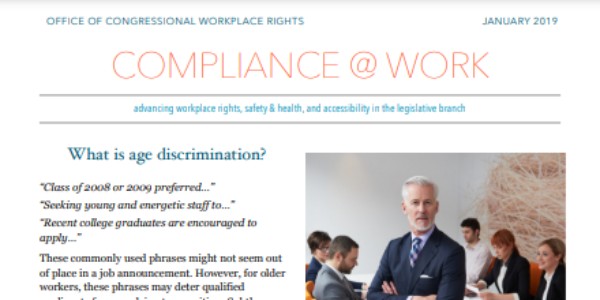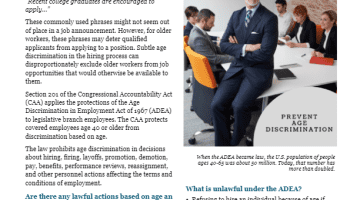What is Age Discrimination
“Class of 2008 or 2009 preferred…”
“Seeking young and energetic staff to…”
“Recent college graduates are encouraged to apply…”
These commonly used phrases might not seem out of place in a job announcement. However, for older workers, these phrases may deter qualified applicants from applying to a position. Subtle age discrimination in the hiring process can disproportionately exclude older workers from job opportunities that would otherwise be available to them.
Section 201 of the Congressional Accountability Act (CAA) applies the protections of the Age Discrimination in Employment Act of 1967 (ADEA) to legislative branch employees. The CAA protects covered employees age 40 or older from discrimination based on age.
The law prohibits age discrimination in decisions about hiring, firing, layoffs, promotion, demotion, pay, benefits, performance reviews, reassignment, and other personnel actions affecting the terms and conditions of employment.
Are there any lawful actions based on age an employer can make?
- Personnel actions directed towards individuals younger than forty (e.g., being denied a promotion because a supervisor thinks the employee is too inexperienced).
- Bona fide seniority or merit systems, provided they are not instituted to discriminate on the basis of age.
- Advertising or hiring on the basis of age only where age is a “bona fide occupational qualification” and reasonably necessary to the essence of the business.
What is unlawful under the ADEA?
- Refusing to hire an individual because of age if over 40.
- Refusing to provide equal compensation, or other terms, conditions, or privileges of employment to a covered employee over the age of 40.
- Limiting, segregating, or classifying a covered employee in any way that would deprive or tend to deprive him or her of an employment opportunity because of age.
- Forcing an employee to retire at a certain age (some narrow exceptions exist).
- Harassing a person because of their age.

